Zoe Bell! Squeeee! Sorry. Got a bit over-excited there. Where was I? This is just a teaser for Raze, a survival horror film that’s being pitched as somewhere between Fight Club for women, and Hostel. And being a teaser, it’s short on actual content. But if it has Bell kicking ass – and that certainly would seem to be the case – along with Rachel Nichols from the last chunks of Alias, then we’re looking forward to it. 2012 is looking like a decent year for action heroines already…
Month: November 2011
Terrifying Girls’ High School: Lynch Law Classroom
★★★★
“Or, as Chris called it, ‘Lynch Law Lolitas’…”
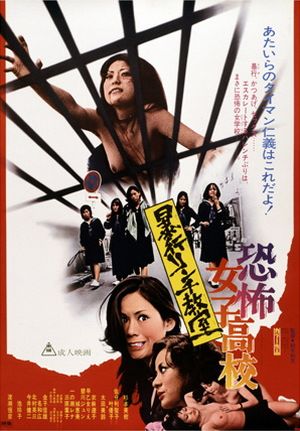
 This was the title that finally ‘broke’ Chris, and she wondered what the hell I was Googling to come across this movie. Shame she missed it, as despite some rather nasty sexual sadism, it’s among the best of the genre. Girl gang leader Noriko (Sugimoto) is assigned to the “School of Hope”, a morally-bankrupt educational establishment for delinquent girls. It’s principal is entirely ineffectual, and it’s actually run by the vice-principal (Imai), with the collaboration of the “Disciplinary Committee,” a group of the girls he allows to dish out punishment. Noriko isn’t going to stand for that, and teams up with a sleazy journalist (Watase) to bring down both the Committee and those in charge.
This was the title that finally ‘broke’ Chris, and she wondered what the hell I was Googling to come across this movie. Shame she missed it, as despite some rather nasty sexual sadism, it’s among the best of the genre. Girl gang leader Noriko (Sugimoto) is assigned to the “School of Hope”, a morally-bankrupt educational establishment for delinquent girls. It’s principal is entirely ineffectual, and it’s actually run by the vice-principal (Imai), with the collaboration of the “Disciplinary Committee,” a group of the girls he allows to dish out punishment. Noriko isn’t going to stand for that, and teams up with a sleazy journalist (Watase) to bring down both the Committee and those in charge.
Right from the opening scene, where the Committee drain the blood of a victim, before she falls to her death from the roof, this certainly grabs the attention. Another review described it as, “Like Mean Girls via Caged Heat as written by Jess Franco and directed by Russ Meyer,” and that’s about as accurate a synopsis as you’ll get. The girls – not just ‘Noriko of the Cross’ [which she has tattooed on her inner thigh], but also “Razor-blade Remi” and the members of the Committee – are undeniably hardcore, and not the kind of people you want to cross. Yet, other sequences are outright misogynistic, such as one pupil being punished by having a light-bulb inserted into her, then being forced to do push-ups. Where did that come from? There’s also a lengthy omorashi fetish sequence. Look it up. Could have done without it as well.
But if you can get past that – not that I would blame you if you couldn’t – the good stuff outweighs the bad. You can even read a socio-political subtext into this, as the early seventies were a time of political instability in Japan, with their Red Army group in operation. The main theme is power: the struggle to achieve or hold on to it, and the final ten minutes, with the entire school rioting and taking on the Japanese police with rocks, stick and other weapons is pretty much a middle finger at all authority. Almost all such structures are portrayed as rife with corruption, and if the male side of the species is not subject to the same level of brutality, they’re cynically depicted as relentlessly perverted and driven by their brains. The only honour or humanity to be found here is with Noriko and her allies, in a severely screwed-up world, and it’s this transgressive approach that deserves approval.
Dir: Norifumi Suzuki
Star: Miki Sugimoto, Reiko Ike, Tsunchiko Watase, Kenji Imai
Criminal Woman: Killing Melody
★★★½
“Hell hath no fury like a woman… Let’s leave it at that, shall we?”
 With a bit more of an intricate plot than most entries, this is the tale of revenge served cold. The Oba Yakuza gang shoot one of their flunkies up with drugs and dump his dead body in a ditch. His daughter, Maki (Ike), tries to stab the boss responsible (Hayama) in a nightclub, but she is, frankly, a bit crap with a blade; the attack fails, and she ends up in prison. There, after proving her toughness in a jail “I quit” match, she is accepted by the other girls, including the heavily-tattooed Masayo (Sugimoto). A few years pass, and Maki gets out of jail; her friends are waiting, and they agree to help in her plan for vengeance. This involves Tetsu, the psycho scion of the Hamayasu clan, who used to rule things before the Oba group came in and kicked their asses. Maki will use him as the scapegoat, to trigger war between the groups, then step in to take out Oba once he has been weakened. That’s the plan, anyway, with Maki whoring herself out, to (gasp!) foreigners and even (shock!) a black airman to get resources. However, a large spanner in the works is that Masayo is also Oba’s wife…
With a bit more of an intricate plot than most entries, this is the tale of revenge served cold. The Oba Yakuza gang shoot one of their flunkies up with drugs and dump his dead body in a ditch. His daughter, Maki (Ike), tries to stab the boss responsible (Hayama) in a nightclub, but she is, frankly, a bit crap with a blade; the attack fails, and she ends up in prison. There, after proving her toughness in a jail “I quit” match, she is accepted by the other girls, including the heavily-tattooed Masayo (Sugimoto). A few years pass, and Maki gets out of jail; her friends are waiting, and they agree to help in her plan for vengeance. This involves Tetsu, the psycho scion of the Hamayasu clan, who used to rule things before the Oba group came in and kicked their asses. Maki will use him as the scapegoat, to trigger war between the groups, then step in to take out Oba once he has been weakened. That’s the plan, anyway, with Maki whoring herself out, to (gasp!) foreigners and even (shock!) a black airman to get resources. However, a large spanner in the works is that Masayo is also Oba’s wife…
I liked the way the girls play the two sides off against each other, using their greed and anger to make them suspicious of each other – it reminded me of spaghetti Western Fistful of Dollars, or more accurately, I suppose, Kurosawa’s Samurai movie Yojimbo on which it was based. However, from an action-heroine point of view, that’s the film’s biggest weakness, as the ladies largely sit on the sidelines, stoking the fire, rather than opening fire themselves. The exceptions are a pair of monumental brawls between Maki and Masayo, that act as bookends to their character development, and possess interesting similarities, from the way both start as knife-fights before becoming hand-to-hand battles, right down to the white powder in which they end up rolling around.
As usual, Ike and Sugimoto hold the viewer’s attention effectively, and I also note the use of a chainsaw by a mobster, an entire decade before Al Pacino went ape in the shower with one for Scarface. That’s a particularly nasty sequence, with Maki bound – as usual, topless – slapped around and threatened with said chainsaw. Then Masayo turns up, with a lit cigarette, and explains to hubby that she knows better “how to torture a woman”. Oh, my… Yep, what transpires is certainly both pink and violent.
Dir: Atsushi Mihori
Star: Reiko Ike, Miki Sugimoto, Yumiko Katayama, Ryoji Hayama
Girl Boss Guerilla
★★★½
“Faster pussycats who kill, kill.”
 After my disappointing first foray, this is more like it, right from the moment Sachiko (Sugimoto) rips open her top, revealing a heavily-tattooed breast, before she and her Red Helmet Gang of biker chicks kick the asses of another, male gang who are hassling them. It’s clear that Sachiko deserves the title far more that the ‘Delinquent Girl Boss’. She and her crew from Tokyo head off to Kyoto, where they face off against, and end up taking control of, the local girl gang – some of whom are none to happy by this invasion [Kyoto being the former capital, its residents seems to hold a grudge against those from Tokyo]. Sachiko ends up on the wrong side of the local Yakuza, one of whom has a sister, Nami (Ike), who is an independent free-agent girl gangster, affiliated with none, but kinda over-seeing all. Sachiko meets and falls for a boxer, Ichiro (Mizushimi), after he helps her girls out of a tough spot with the Yakuza, and follows him to a seaside resort where he is training. Needless to say, love does not quite conquer all.
After my disappointing first foray, this is more like it, right from the moment Sachiko (Sugimoto) rips open her top, revealing a heavily-tattooed breast, before she and her Red Helmet Gang of biker chicks kick the asses of another, male gang who are hassling them. It’s clear that Sachiko deserves the title far more that the ‘Delinquent Girl Boss’. She and her crew from Tokyo head off to Kyoto, where they face off against, and end up taking control of, the local girl gang – some of whom are none to happy by this invasion [Kyoto being the former capital, its residents seems to hold a grudge against those from Tokyo]. Sachiko ends up on the wrong side of the local Yakuza, one of whom has a sister, Nami (Ike), who is an independent free-agent girl gangster, affiliated with none, but kinda over-seeing all. Sachiko meets and falls for a boxer, Ichiro (Mizushimi), after he helps her girls out of a tough spot with the Yakuza, and follows him to a seaside resort where he is training. Needless to say, love does not quite conquer all.
I really like the two heroines here, who are just about everything I expected from the genre, combining toughness and beauty, savagery and tenderness. Both actresses are excellent, fleshing out (pun not intended…) what could easily have been no more than shallow stereotypes. What doesn’t sit so well is the strange lurches in tone. Oh, look: here’s a (supposedly) hilarious sequence where one of the girls catches VD from a priest, then deliberately passes it on to the Yakuza! Oh, hold my aching sides… Then, there’s a bit of unintentional hilarity where a Japanese hippie sings a mournful lament to a dead friend, accompanied by his guitar – but the soundtrack is very clearly a piano. Barely have you finished rolling around the floor laughing hysterically at that, then there’s a genuinely nasty torture sequence involving rather a lot of topless whipping, which appears to have strayed in from a very different movie entirely.
This inconsistency of approach makes for a rather jarring experience, as it switches gears like a badly-maintained Model T, and seems at odds with the female empowerment present in much of the film. However, this still remains a pleasing slab of exploitation for the not-easily offended. Below, you’ll find what Youtube calls a ‘trailer’ but is really more a random selection of clippage; however, it’ll still give you an idea of what to expect.
Dir: Norifumi Suzuki
Star: Miki Sugimoto, Reiko Ike, Michitaro Mizushimi
Delinquent Girl Boss: Worthless to Confess
★★½
“Not very violent, and certainly not pink.”
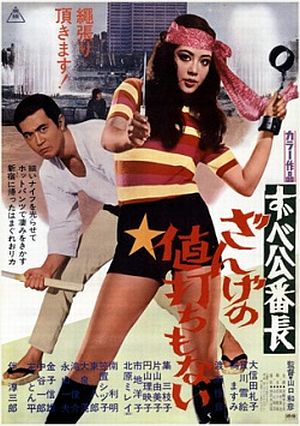 When Rika (Oshida) gets out of reform school, she goes to visit her friend Midori (Katayama), and gets a job working in the garage belonging to Midori’s father Muraki (Ban), even though Midori is estranged from him – except when she needs money to pay off her boyfriend’s gambling debts to the local Yakuza under Boss Ohya (Nobuo Kaneko). Another friend of Rika’s is working in an “art studio”, doing nude modelling to support her sick husband, and still others are hostesses at the Ginza Girls cabaret, a dance-hall which Ohya’s gang are also extorting for protection money. After Muraki has to take a loan using the garage as collateral to pay Ohya, Rika tries to offer herself as an alternative to the boss. This goes about as well as you’d expect, though there’s a genuinely cool twist in which we find someone isn’t quite who we seem. There’s a tragic fatality, which sets the scene for all the girls to get together and take on Ohya’s gang.
When Rika (Oshida) gets out of reform school, she goes to visit her friend Midori (Katayama), and gets a job working in the garage belonging to Midori’s father Muraki (Ban), even though Midori is estranged from him – except when she needs money to pay off her boyfriend’s gambling debts to the local Yakuza under Boss Ohya (Nobuo Kaneko). Another friend of Rika’s is working in an “art studio”, doing nude modelling to support her sick husband, and still others are hostesses at the Ginza Girls cabaret, a dance-hall which Ohya’s gang are also extorting for protection money. After Muraki has to take a loan using the garage as collateral to pay Ohya, Rika tries to offer herself as an alternative to the boss. This goes about as well as you’d expect, though there’s a genuinely cool twist in which we find someone isn’t quite who we seem. There’s a tragic fatality, which sets the scene for all the girls to get together and take on Ohya’s gang.
As you can tell, there’s no shortage of plot going on here. However, the overall result is more like an overwrought Japanese soap-opera, with a lack of much delinquence, or indeed, real action of any kind from the girls, up until the last ten minutes. Indeed, there’s very little exploitation present at all, with a surprising lack of nudity as well, though personally, this is less a concern. Reading various reviews elsewhere, there is a broad spectrum of opinion as to whether this makes it the best or the worst in the series. I tend to be somewhere in the middle: while I can appreciate the dramatic elements, and the two lead actresses are good in their roles, it’s not what I expected at all, being too worthy, and completely lacking any sense of excess of transgression.
I’m definitely uncertain where the poster image comes from, although that may be because I had to look at it twice, since the first time I thought she was holding a yo-yo. Must have been some kind of residue from Sukeban Deka, I guess.
Dir: Kazuhiko Yamaguchi
Star: Reiko Oshida, Yumiko Katayama, Junzaburo Ban
Pinky violence
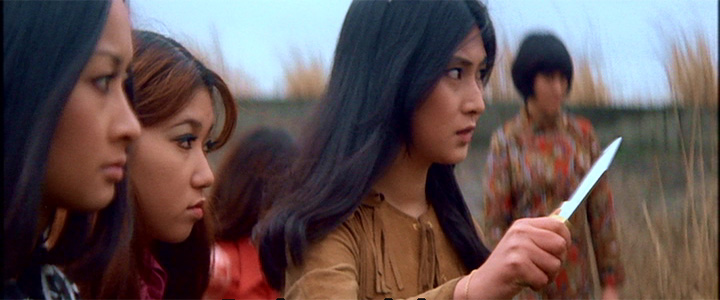 “Pinky violence” is a genre of cinema that flourished in Japan during the 1970’s. It was spawned from the “pink film” genre of sexploitation movies, which started the previous decade with Satoru Kobayashi’s Flesh Market, which grossed over 100 million yen on a budget of just eight million. It was originally the domain mostly of independent producers and studios, but as the Japanese market became tougher, due to competition from imported movies and other forms of entertainment, major studios like Nikkatsu and Toei moved in to the field. While the former took the more traditional route, Toei opted to merge sex with the other staple of exploitation cinema, violence.
“Pinky violence” is a genre of cinema that flourished in Japan during the 1970’s. It was spawned from the “pink film” genre of sexploitation movies, which started the previous decade with Satoru Kobayashi’s Flesh Market, which grossed over 100 million yen on a budget of just eight million. It was originally the domain mostly of independent producers and studios, but as the Japanese market became tougher, due to competition from imported movies and other forms of entertainment, major studios like Nikkatsu and Toei moved in to the field. While the former took the more traditional route, Toei opted to merge sex with the other staple of exploitation cinema, violence.
But what makes them of interest here, is their focus on women as the central characters, active participants in the violence, rather than simply being passive victims. Frequently, the heroines are sukeban, a term which means “delinquent girl” or “bad girl”, often operating in conjunction with, or leading, other girls in a gang, This may form part of a larger Yakuza enterprise, or work entirely independently. Sometimes, the focus is on obtaining revenge or justice for some past crime, whether against the girl or someone she loves. The ratio of sex to violence did vary, as did the setting: while most had a contemporary setting, films like Lady Snowblood took the themes are ran them out against a period backdrop.
While the ‘golden era’ of the genre is generally considered to be in the seventies, the influences and general themes continue on. They can be seen in the likes of the Female Prisoner Scorpion and Zero Woman series, and arguably, even in the new wave of Tokyo Gore movies, such as Mutant Girl Squad or Gothic & Lolita Psycho. We started by reviewing the four movies included in the box-set released by Panik House in December 2005. While it’s now out of print, its contents remains available from various sources, and it’s as good a place to begin as any. Further entries will continue to be added during the coming months, with the movies listed in order of release date.
See also
- Operation Pussycat
- Prisoner Maria: The Movie
- Sasori
- Scorpion: Double Venom
- Scorpion’s Revenge
- Sukeban Hunters
And, in chronological order
- Legend of the Poisonous Seductress: Female Demon Ohyaku
- Delinquent Girl Boss: Blossoming Night Dreams
- Girl Boss Blues: Queen Bee’s Counterattack
- Delinquent Girl Boss: Worthless to Confess
- Girl Boss Blues: Queen Bee’s Challenge
- Girl Boss Guerilla
- Wandering Ginza Butterfly
- Rika the Mixed-Blood Girl
- Wandering Ginza Butterfly 2: She-Cat Gambler
- Criminal Woman: Killing Melody
- Female Yakuza Tale: Inquisition and Torture
- Girl Boss: Escape From Reform School
- Terrifying Girls’ High School: Lynch Law Classroom
- Rica 2: Lonely Wanderer
- Rica 3: Juvenile Lullaby
- The Yakuza Wives
- Bloodbath at Pinky High, Part 1
- Bloodbath at Pinky High, Part 2
Bloodrayne 3: The Third Reich
★★½
“Probably just about the best of the series to date. Take that as you will.”
 After the abomination that was Part 2, I’d filed the third entry under ‘watch whenever I have time’, until a spirited debate on its merits (or otherwise) broke out on over oun our GWG forums. That got this one fast-tracked, and I am here to pronounce the official word is… it’s alright, I s’pose. Malthe has improved markedly since she took over the role from Kristanna Loken. In #2, she was little more than a clothes-horse, but now possesses some genuine charisma, though in terms of fighting skills, still leaves a good chunk to be desired. The makers, apparently realizing this, offer distraction in the way of ample cleavage shots, and some gratuitous nudity – which, if your luck is like mine, is exactly when your wife will walk in. Admittedly, telling her I was going to be watching Schindler’s List was probably a mistake, in hindsight…
After the abomination that was Part 2, I’d filed the third entry under ‘watch whenever I have time’, until a spirited debate on its merits (or otherwise) broke out on over oun our GWG forums. That got this one fast-tracked, and I am here to pronounce the official word is… it’s alright, I s’pose. Malthe has improved markedly since she took over the role from Kristanna Loken. In #2, she was little more than a clothes-horse, but now possesses some genuine charisma, though in terms of fighting skills, still leaves a good chunk to be desired. The makers, apparently realizing this, offer distraction in the way of ample cleavage shots, and some gratuitous nudity – which, if your luck is like mine, is exactly when your wife will walk in. Admittedly, telling her I was going to be watching Schindler’s List was probably a mistake, in hindsight…
As you can likely surmise from the title, this takes place in World War II – if you’re playing along at home, that’s three different centuries for the movies now, so I guess the next one will have to be ‘Bloodrayne in Space’ [Uwe, send payment for this idea to the PO Box, please]. During an attack on a train taking ‘undesirables’ to the death camps, Rayne sinks her fangs into the local Kommandant (Pare). However, she doesn’t kill him, and with the help of the local resistance, has to clean up the resulting mess, before Der Kommandant and his mad doctor (Howard) can get to Berlin and turn Hitler into Der VampireFuehrer.
The main problem is that runs only about 70 minutes before the very slow end-credit crawl, and feels like a good hour is missing somehow, as the storyline leaps about, and rushes through a finale that seems completely unsatisfying and badly under-written. The result is a movie where the individual scenes are decent enough, yet you reach the end and find yourself thinking, “Is that it?” and wondering if you had dozed off someehere in the middle. The sense of unfulfilled expectations are likely down to this. If the movie is certainly a clear upgrade on its immediate predecessor, it’s hard to see how it could be otherwise. Still, I’d like to see what Malthe can do in a less apparently-hurried production.
Dir: Uwe Boll
Star: Natassia Malthe, Michael Pare, Brendan Fletcher, Clint Howard
Death Row Girls
★★
“Despite the poster, more WiP than GwG.”
 Misaki (Hoshino) is in prison for stabbing a policeman to death, but is taken from her jail to a remote island. There, she joins the rest of the hand-picked prisoners, who are there to be trained by a mysterious government organization, and moulded into operatives who can be used to protect national security. Most of the inmates just want to make things easy, sleeping with the guards in exchange for privileges, but Misaki is made of tougher stuff, and won’t buckle down to the authorities. While she begins plotting how to escape the island, she needs to overcome a number of problems, not least having no idea about where it is, and whether the small boat they stumble across will be capable of getting them to any other land.
Misaki (Hoshino) is in prison for stabbing a policeman to death, but is taken from her jail to a remote island. There, she joins the rest of the hand-picked prisoners, who are there to be trained by a mysterious government organization, and moulded into operatives who can be used to protect national security. Most of the inmates just want to make things easy, sleeping with the guards in exchange for privileges, but Misaki is made of tougher stuff, and won’t buckle down to the authorities. While she begins plotting how to escape the island, she needs to overcome a number of problems, not least having no idea about where it is, and whether the small boat they stumble across will be capable of getting them to any other land.
There’s definitely elements of Nikita here, not least the sequence where Misaki tries to take the facility head hostage. Except that, where that breezed through the training inside 25 minutes, it is, more or less, the entire focus of proceedings here. Hoshino snarls nicely as an independent and feisty bad girl, yet neither she nor any of the other residents are in the slightest bit convincing. I’d normally avoid using a phrase like “runs like a girl” as unnecessarily demeaning… except here, where it’s entirely accurate. I can see absolutely no chance – zero, zip, nada – that any credible group would select her, or the rest of the inmates, as potential trainees.
The film does deliver the expected helpings of gratuitous nudity and moderate violence, as things bumble along towards the climax, where Misaki has to battle her jail friend, to the death. Winner gets to leave, loser…well, will be dead, so shouldn’t worry themselves about it. It’s not exactly the best knife-fight you’ve ever seen, and the ending leaves a good deal to be desired in terms of tying up the loose ends as well. The 84 minutes passed reasonably enough though, and it’s reasonably competent, albeit by the genre’s fairly-low standards.
Dir: Sadaaki Haginiwa
Star: Aki Hoshino, Emi Kitagawa, Ren Suzuki, Ami Natsui
a.k.a. Female Prisoner 1316
Gothic & Lolita Psycho
★★★½
“First martial arts movie where the heroine dresses like a refugee from a Sisters of Mercy concert. Er, kids, ask your parents.”
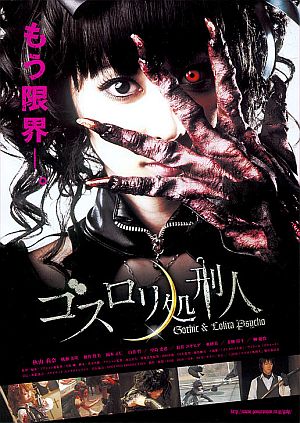 First of all, “Gothic Lolita” is a Japanese style term; Lolita fashion is based on clothing from the Victorian era, and the Gothic sub-genre is…well, suitable for a Victorian funeral, basically. Quite why heroine Yuki (Akiyama) decides to dress like this, after her mother is murdered by a group of five thugs, is never satisfactorily explained. Actually, it’s never even mentioned, putting it alongside the issue of why her father (Yanagi) is apparently a Christian priest, now confined to a wheelchair as a result of the attack. Or where Yuki is now a skilled fighter, armed with a bulletproof, lethal umbrella that can kill you in a variety of ways. Where does she get those wonderful toys, to borrow a phrase.
First of all, “Gothic Lolita” is a Japanese style term; Lolita fashion is based on clothing from the Victorian era, and the Gothic sub-genre is…well, suitable for a Victorian funeral, basically. Quite why heroine Yuki (Akiyama) decides to dress like this, after her mother is murdered by a group of five thugs, is never satisfactorily explained. Actually, it’s never even mentioned, putting it alongside the issue of why her father (Yanagi) is apparently a Christian priest, now confined to a wheelchair as a result of the attack. Or where Yuki is now a skilled fighter, armed with a bulletproof, lethal umbrella that can kill you in a variety of ways. Where does she get those wonderful toys, to borrow a phrase.
What matters here are her battles against the five killers, starting with a gambling den house-mother, through a lecherous and psychic teacher, up to the “big bad” (Aoyagi), the man who co-ordinated and led the attack on her parents. They’re a decidedly mixed bag. The lower tier make it clear that Akiyama was likely not cast for her fighting talents, but more to do with her being named “Best Butt in Japan” for 2007, though the film is pleasingly free of nudity. The best is probably her fight against Lady Elle (Momose), a marvellous character who comes off like a highly-caffeinated version of Elle Driver crossed with Hit Girl, complete with sparkly eyepatch and a gun that flips open into a pink mobile phone. I could have watched those two for the entire movie, bickering and brawling.
Yeah, if you hadn’t noticed, it’s more than a little like Kill Bill, though mercifully without anyone droning on about comics. The final battle isn’t quite up to the same level, and there’s a twist in the ending which is probably not necessary: it adds a level of fantasy to proceedings that goes nowhere. But despite the flaws, it remains a unique item, and if you appreciate the recent wave of Japanese hypersplatter, this is another entry you’ll enjoy in the genre, with everyone possessing appropriately-high blood pressure.
Dir: Go Ohara
Star: Rina Akiyama, Yurei Yanagi, Ruito Aoyagi, Misaki Momose
The Breakout
★★★½
“Really, DVD company? “Ultimate chick fighting”? Sheesh.”
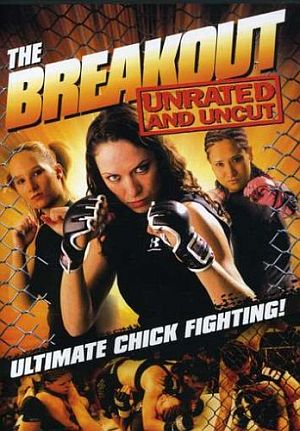 S’funny what you stumble across on Netflix, at the end of a long chain of “See also…” recommendations came this, which according to the Amazon listing, this was “the first ever all women’s Mixed Martial Arts fight card.” Which it isn’t. I can state this for a fact, because we already reviewed Hook ‘n’ Shoot: Revolution, from almost five years prior to this night in Minnesota. This has similar strengths and weaknesses: there are clearly a number of talented women fighters, but it’s hard to put together a card without mismatches.
S’funny what you stumble across on Netflix, at the end of a long chain of “See also…” recommendations came this, which according to the Amazon listing, this was “the first ever all women’s Mixed Martial Arts fight card.” Which it isn’t. I can state this for a fact, because we already reviewed Hook ‘n’ Shoot: Revolution, from almost five years prior to this night in Minnesota. This has similar strengths and weaknesses: there are clearly a number of talented women fighters, but it’s hard to put together a card without mismatches.
The most obvious one here is a main event which pitted Megumi Fujii against local fighter Cody Welchlin. Fujii was a perfect 10-0, while Welchlin had exactly one fight on her record. I read online Welchlin was a late replacement, and if so credit is due for taking on one of the top fighters in the world at two weeks notice. However, the result was exactly as you’d expect, and over inside three minutes [Fujii has subsequently become only the second MMA fighter of either sex to start her career going 22-0 – and the consensus is, the sole defeat on her record was a highly-dubious loss]. The penultimate fight between another local, Kelly Kobold and Adrienna Jenkins, was more even, with both fighters having double-digits victories. But Kobold charged in from the get-go, and never let up, even raining up punches when Jenkins was above her, and those blows resulted in a verbal submission at 3:26 in the first round.
Three minutes was about the average length of the bouts; Ginele Marquez got a rear naked choke on her opponent Liz Posener at the 3:16 mark in her bout. Marquez had Gina Carano in her corner: Carano is not just one of the top fighters in women’s MMA, she’s also the star of the upcoming Stephen Soderbergh flick Haywire. Was quite surprised the production didn’t mention her presence at all, as they did speak to some of the male MMA artists present, such as Jens Pulver [who was Jenkins’ fiancé]. Erin Toughill, another noted name, was also involved, doing colour work round the cage, and the production came over as generally slick and professional.
 The shortest match of the night – lasting exactly one minute – was a bit unfortunate, as Shayna Baszler actually broke the arm of her opponent, Samantha Anderson. She was applying a submission hold on the arm, but it seemed that Baszler fell forward, resulting in the pressure being made much worse, and resulting in a clean break of her humerus. Ouch. The opening contest [on the DVD – there was an amateur fight not included for some reason] was the only one that lasted longer than one five minute round, with Marissa Inhofer beating Kirsty Bushnell. As well as being the brother of another MMA figher [Nick Inhofer was on The Ultimate Fighter 3] Inhofer was a roller-derby girl, and seemed to have brought a large contingent of her team-mates with her.
The shortest match of the night – lasting exactly one minute – was a bit unfortunate, as Shayna Baszler actually broke the arm of her opponent, Samantha Anderson. She was applying a submission hold on the arm, but it seemed that Baszler fell forward, resulting in the pressure being made much worse, and resulting in a clean break of her humerus. Ouch. The opening contest [on the DVD – there was an amateur fight not included for some reason] was the only one that lasted longer than one five minute round, with Marissa Inhofer beating Kirsty Bushnell. As well as being the brother of another MMA figher [Nick Inhofer was on The Ultimate Fighter 3] Inhofer was a roller-derby girl, and seemed to have brought a large contingent of her team-mates with her.
I can’t claim to be an expert in MMA, but as noted, the ‘Ultimate Chick Fighting!’ tag on the DVD sleeve does the women involved a disservice. As one of the commentators pointed out, “Pain doesn’t discriminate,” and it was also noted that it’s harder for women, since they typically have to hold down a full-time job, as well as fit in the rigourous training required. Respect is definitely in order. However, at the point of this event (March 2007), there still seems to be a lack of depth in the talent pool, which leaves a card like this short of truly successful.
Star: Megumi Fujii, Kelly Kobald, Adrienna Jenkins, Cody Welchlin




